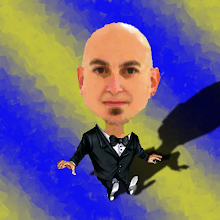Lunchtime Book Review: V.
Finished up my bday present from Earl's Donuts the other day and figured I'd try to sputter out some inconsequential ramblings on it. First though, I wanna cry. Thomas Pynchon was 24 when this book was published. When I was 24 I hadn't yet mastered a really good hangover (I don't drink that much or often, but I've got hangovers down pat now). If I'd been around in the early 60s, I'd have pooh-poohed him as yet another early bloomer, flaming out like a supernova before 30. So at least I don't look like an idiot for saying that prior to Pynchon's long and magnificent career.
I hadn't read any Pynchon since my teens? early 20s? somewhere around there. About 20 years ago I pushed through Gravity's Rainbowand remember very little about it to this day. When I think about it, I recall a scene making banana pancakes (which, honestly, could have been in Catch-22
instead, as I read them around the same time) and an overwhelming connection to the TMBG song Road Movie to Berlin. Clearly, I've got to reread GR.
A huge cast of characters, multiple interconnected stories spanning 60-odd years, and a central, mysterious figure tying it all together. My first take after closing the book up Thursday at lunch (and I'm still sticking with that gut reaction today) is that V. is the apotheosis of the mechanization and dehumanization of the 20th century. As a humanist, Pynchon's most sympathetic characters are the ones out of place in the modern world: Benny the schlemiel, always at odds with the inanimate world; Stencil and his quest to live out his father's life of intrigue as he tracks the scent of the elusive V.; Stencil-pater and Hugh Godolphin, the Victorian and Edwardian servants of Britain. V. is not sympathetic. In every tale and incarnation, she is shrewd, cunning, manipulative, and increasingly less human. Hers is the cold, clockwork heart of the 20th century.
Malta plays a key role in the quest for V., so it is interesting that Pynchon describes it as timeless, a rock, unchanging, eternal. Obviously untrue in some regards, she does seem untouched by time until Messerschmidts drop their payloads:
Don't touch them, these walls. They carry the explosions for miles. The rock hears everything, and brings it to bone, up the fingers and arm, down through the bone-cage and bone-sticks and out again through the bone-webs. Its little passage through you is accident, merely in the nature of rock and bone: but it's as if you were given a reminder.Earl's Donuts and I had a brief IM chat when I'd finished. He hadn't read V. in years, but his take had been (and I'm over-simplifying here...elaborate in comments if you'd like, N.) that V. was Pynchon's symbol of time itself. Of course, that makes Malta's eternal nature even more significant.
The vibration is impossible to talk about. Felt sound. Buzzing. The teeth buzz: Pain, a numb prickling along the jawbone, stifling concussion at the eardrums. Over and over. Mallet-blows as long as the raid, raids as long as the day. You never get used to it. You'd think we'd all have gone mad by now. What keeps me standing erect and away from the walls? And silent. A brute clinging to awareness, nothing else. Pure Maltese. Perhaps it is meant to go on forever. If "forever" still has any meaning.
Certainly it does make sense: V. is ever-present. V. is felled in an eternal place by machines that may be harbingers of an end to time. As V. lay dying, her body is picked over by children (those who have no sense of time). If the world is to end in a fire of our own design, it was dreamt of because of those bombers and because of that war. The children picking over V.'s corpse will be the generation to ignite that fire. But those children are Pynchon's contemporaries. What does that say?
Obviously, with as playful a writer as Pynchon, any first-pass analysis is going to be too facile. I could spend hours merely analyzing his character names, rich with meaning: Benny Profane; Herbert Stencil; Dudley Eigenvalue; Mélanie l'Heuremaudit. I could also spend hours at the V. portion of the Pynchon Wiki. Instead, I'll just cycle V. back into the bottom of my pile of books to read and go through it again in the next year or two.
Next up for the lunchtime read and review, the far more straightforward A Mouthful of Air: Language, Languages...Especially English

0 comments:
Post a Comment